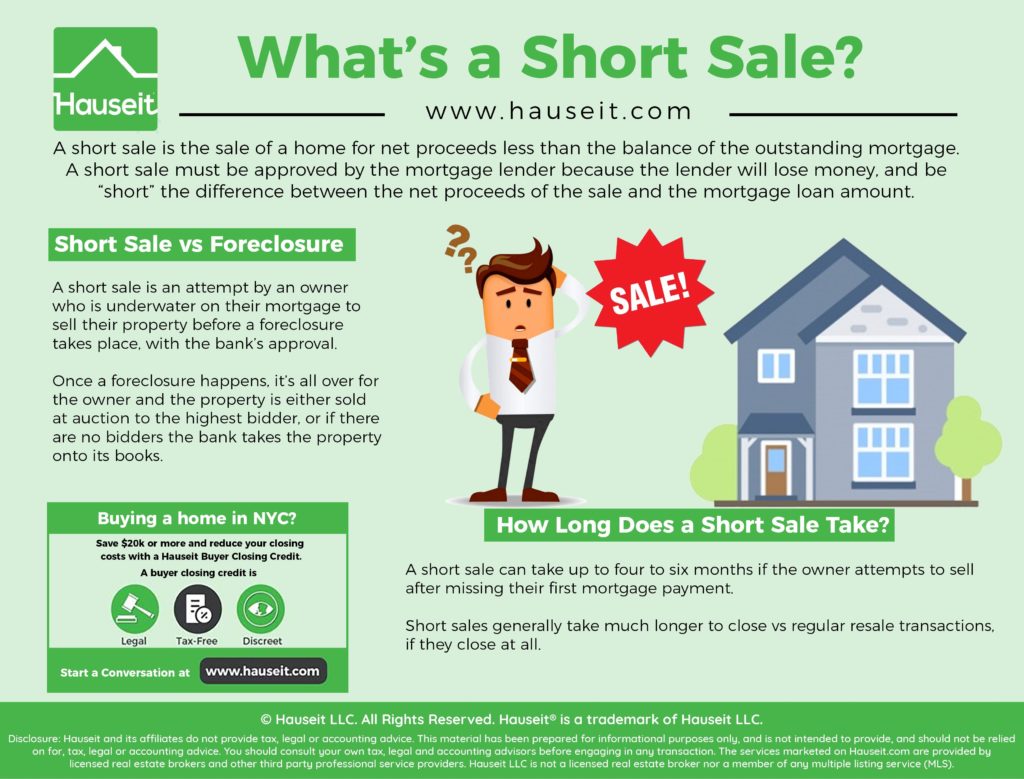A short sale is the sale of a home for net proceeds less than the balance of the outstanding mortgage. A short sale must be approved by the mortgage lender because the lender will lose money, and be “short” the difference between the net proceeds of the sale and the mortgage loan amount.
Table of Contents:
A short sale is an attempt by an owner who is underwater on their mortgage to sell their property before a foreclosure takes place, with the bank’s approval. If the owner does not get permission from the bank to execute a short sale, or does not execute one in time, then the property will be foreclosed on.
Once a foreclosure happens, it’s all over for the owner and the property is either sold at auction to the highest bidder, or if there are no bidders the bank takes the property onto its books. Properties that are not sold at auction and which go on banks’ balance sheets are called real estate owned (REO) properties.
Our Discretion, Your Advantage
Our traditional partner brokers never openly discount which means less disruption and better execution for you.
A short sale can take up to four to six months if the owner attempts to sell after missing their first mortgage payment because the average time between missing your first payment to foreclosure is approximately four to six months.
However, a short sale can be negotiated prior to the owner missing a mortgage payment, which will enable the seller to have more time to negotiate and close a short sale.
Short sales generally take much longer to close vs regular re-sale transactions, if they close at all.
That’s because banks won’t pay attention to sellers until they have a signed contract, and potential buyers will be reluctant to sign a contract if they don’t even know if the bank will approve a short sale.
As a result, it’s a bit of a Catch-22 for short sellers.
Often times, it’s buyers who will negotiate an outside date for the deal to happen if they sign a contract. For example, a buyer may agree to sign a contract, with a contingency that the short sale must be approved within one month or even three months.
Save 2% On Your Home Purchase
Save thousands on your home purchase with a buyer agent commission rebate from Hauseit
The short sale process typically starts when a homeowner misses a mortgage payment for the first time. When this happens, the homeowner is faced with a few tough choices: make a late payment plus late fees, attempt to refinance or attempt to sell.
Refinancing becomes very difficult especially if the expected market value of the home is less than the mortgage loan balance, and also because missing a mortgage payment has a serious, negative effect on one’s credit score.
Selling before a foreclosure happens is usually the best option unless the owner is able to secure a gift or some other source of funds to pay the mortgage plus late fees.
Once the owner makes the decision to sell, he or she should consult a local real estate broker experienced with short sales and foreclosures.
Brokers are only paid if a deal closes, and this offer of potential commission is what enables sellers to work with someone without having to fork over cash up front.
On the flip side, most real estate attorneys will not bother with potential short sellers because they typically will have no money to pay the attorney. Remember that lawyers are typically paid a flat fee, with some portion often paid upfront.
Once a short sale specialist broker is enlisted, he or she will attempt to find the right person at the mortgage lender to speak with on the borrower’s behalf, after getting the owner / borrower to sign a letter of consent.
This is no easy task as there is a lack of consistency in titles and even department names between banks. Furthermore, bankers are typically overwhelmed and will have little time to pay attention to a potential short sale, where they are being asked to take a haircut on their loan.
Once the broker finally reaches the right person at the mortgage lender, he or she will ask for the bank’s short sale application.
The point of this application is to demonstrate that the borrower truly can’t pay the mortgage, and why agreeing to a short sale is the most logical outcome.
This application will require the borrower to again provide the bank with all of their personal and financial information: social security number, bank statements, W-2 forms, retirement account statements, etc. The borrower’s broker will also include a “broker’s opinion of value” along with the short sale application. Often times, the bank will seek their own broker’s opinion of value from a different broker that they have a relationship with.
The most likely outcome after submitting the short sale application is total silence from the bank. Remember that bankers are overwhelmed with other tasks and won’t take your application seriously until you have a signed purchase contract. As a result, you will have to convince your broker to list and market your property without any assurance that the bank will even ever approve the short sale.
Once a property is listed, the marketing and sale process is no different from that of a regular re-sale. As of this writing, the average days on market for a property in NYC is just over 100 days.
Once a property is in contract, the time to close can range from 30 to 90 days on average, depending on whether the buyer is financing or purchasing all cash.
Note that some MLS systems like the HGMLS in Hudson Valley will require listing brokers to note that a property is a short sale; however, this data is typically not fed to public search websites such as Zillow. As a result, casual browsers will not able to tell from searching on most public real estate search websites that a property listed for sale is actually a short sale.
Remember that the contract negotiation process can be longer and more difficult for a short sale. Buyers will be hesitant to sign a contract before a short sale has been approved, because why would they hand over an earnest money check if a deal may never even happen? Meanwhile, sellers typically need a signed contract to be able to get banks to take their short sale application seriously and approve it.
As a result, savvy buyers will often negotiate a smaller down payment and a set, automatic contract cancellation date if a short sale doesn’t get approved by then.
Furthermore, the due diligence period before a contract is signed can be complicated if the title report comes back with lots of issues. That’s because a short seller likely owes money to many sources and the title won’t be clean, meaning that there could be liens, judgments or violations on the property.
Since buyers expect to be delivered a clean title at closing, any other liens or encumbrances must be remedied before or at closing. Practically speaking, this means any other debt holders with a lien on the title must also agree to the short sale.
Once a buyer has been found, broker fees negotiated and a contract of sale has been negotiated, the short seller’s broker can go back to the bank to push for approval of the short sale.
If the contract price is reasonable and in line with market values, the bank will usually agree to a short sale because banks have no desire to be property managers. In fact, REO properties not only deteriorate because they are uninhabited, but they also count as a non-performing loan (NPL) on banks’ balance sheets.
This is not something that banks want because NPLs mean regulators will require the bank to set aside more equity and equity like capital as a cushion against potential losses.
Disclosure: Hauseit® and its affiliates do not provide tax, legal, financial or accounting advice. This material has been prepared for informational purposes only, and is not intended to provide, and should not be relied on for, tax, legal, financial or accounting advice. No representation, guarantee or warranty of any kind is made regarding the completeness or accuracy of information provided.







